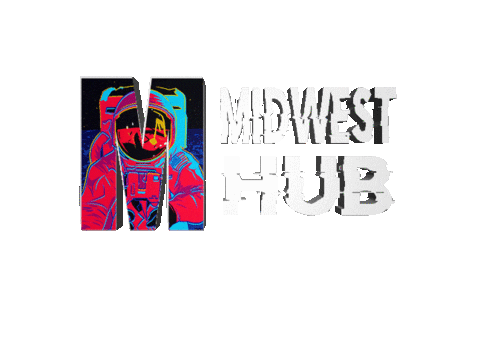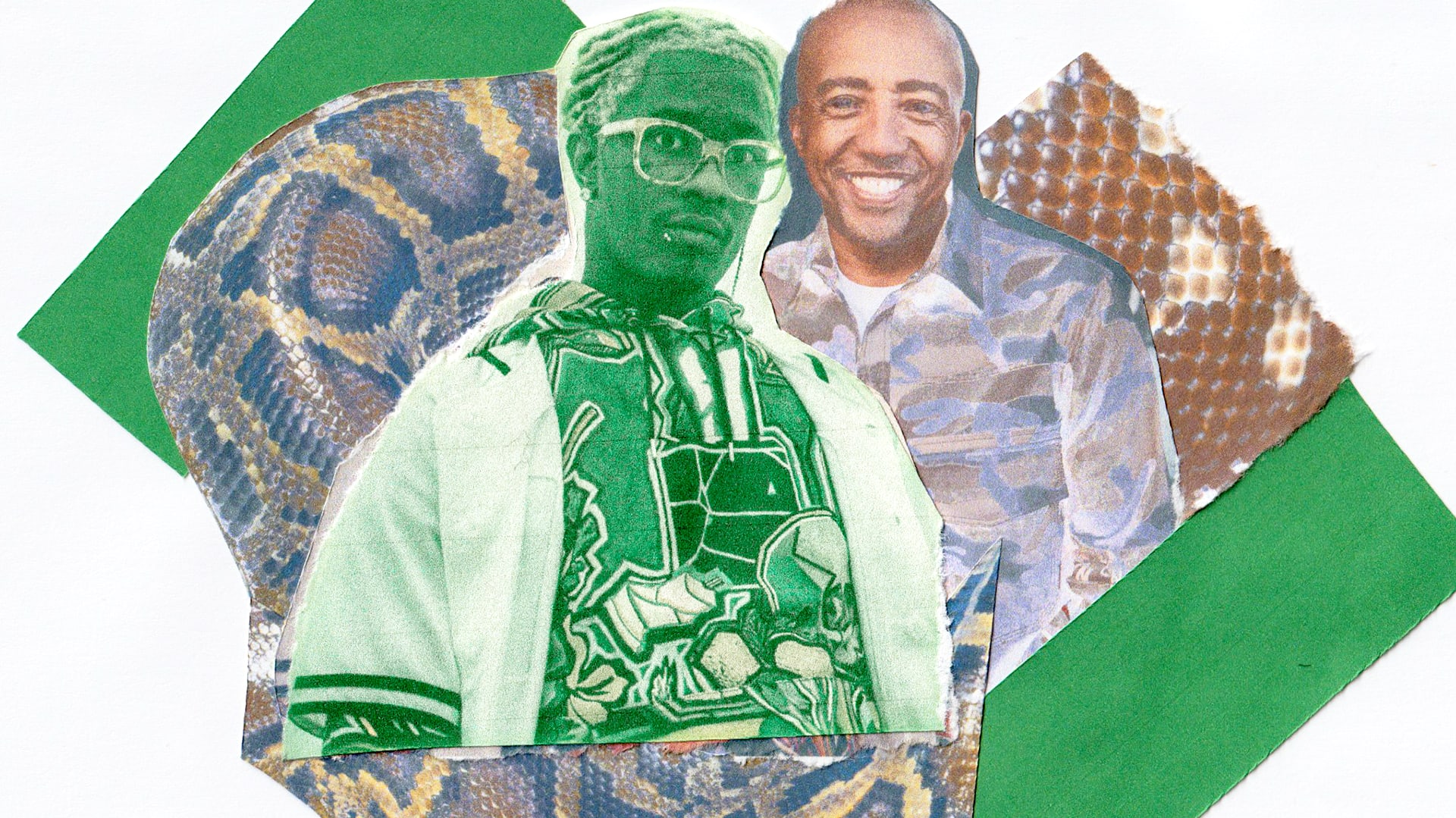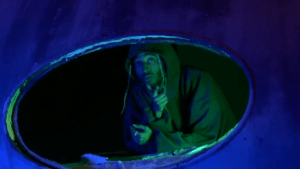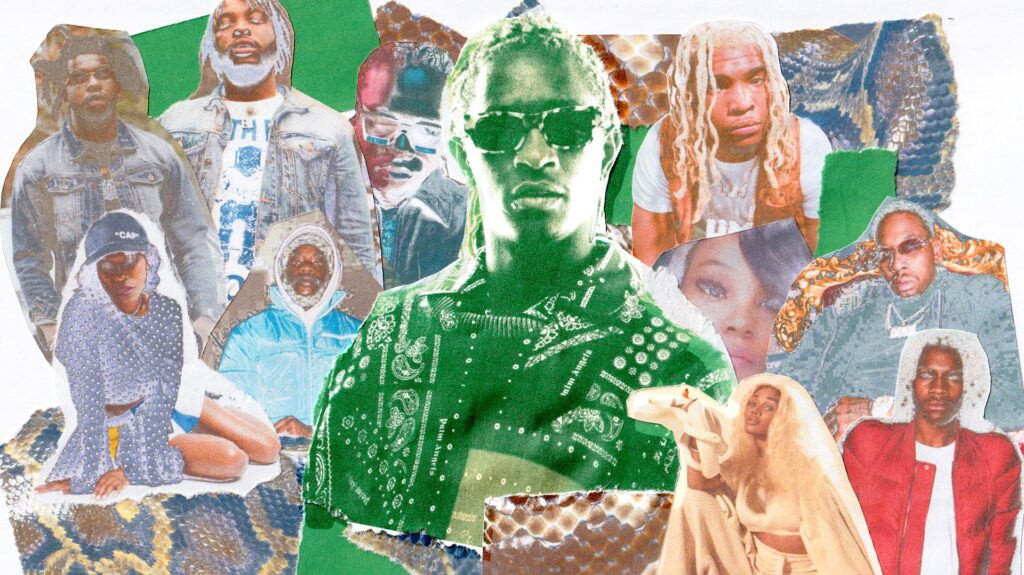
Young Thug’s Young Stoner Life Records doesn’t operate like any other label in the music industry. This is the full story behind the rise of YSL.
Four years ago, Young Thug shared a major announcement. On November 15, 2016, he went on Snapchat and revealed that he was officially launching his own music imprint, YSL (Young Stoner Life Records), under 300 Entertainment.
In the short video clip, Thug previewed his new office and unveiled the logo for YSL. As the camera panned around the workspace, Kevin Liles, co-founder and CEO of 300, gave a congratulatory speech.
“The most important thing I could say to all of you guys is not whether it’s 300 or YSL,” Liles began, acknowledging a small crowd of label staff before turning his attention to Young Thug. “Look at the guy who committed to us every single day, always standing 300 with us. Him starting a new venture is going to take us to a different mindset. He’s not just an artist in this particular case.”
A lot has changed since then. Instagram Stories has replaced Snapchat as the place to drop ephemeral content, hip-hop has become the most popular genre for the first time in music history, and YSL has signed over a dozen artists and released over 50 projects, eight of which have charted on the Billboard 200.
But through all those changes, two things have remained constant: Young Thug is by no means just an artist, and YSL isn’t an ordinary label. YSL’s influence on the sound of modern rap is indisputable, but the label’s real superpower comes from its close-knit relationships. From its inception, YSL has operated as a family, with Thug recruiting his siblings and longtime friends to make up the roster of the labels.
The past two years have been especially pivotal to YSL’s success, with Thug becoming more commercially successful than ever before, and artists like Gunna and Lil Keed forging paths for themselves as breakout stars. But a cloud of mystery still looms over the imprint. Who is on the roster? What’s 300’s involvement?
To what extent is Young Thug really a part of the day-to-day responsibilities of the label? Basic details about the inner workings of YSL have surfaced on rare occasions, but many of those questions remained unanswered. Until now. For the first time, executives and artists in the YSL camp are ready to share the full story behind one of hip-hop’s most successful new labels.
“There’s no crew that works as hard as they work, and we have the studio bills to show it.” – Kevin Liles
To understand the YSL story, you need to go back to the early stages of Young Thug’s career. Back in 2012 and 2013, he was just transitioning from a local hero to a national sensation. According to some key players, the time and energy that Thug put into his solo career during that period played a major role in how he would approach building his YSL empire years later.
“It was a struggle,” remembers Thug’s sister Dora, a YSL signee who performs under the name HiDoraah. “I just remember all of the hard work and dedication that it took, seeing him go 24 hours in the studio. At first, it was one foot in, one foot out. But with the support from me and Dolly and our other brothers and sisters and mom and dad, we stayed on him so he would understand he could do something. But it wasn’t an easy thing for him.”
Dolly White, Thug’s other sister, remembers what life was like the year before things fell into place. “My mom and dad didn’t have a lot. So we never had a lot of space in all of our places. I will never forget how we struggled so bad. Like, we never had air,” she recalls. “2013 was the most struggling year. Oh my God, it makes you thank the Lord, and just be thankful for life.”
A year later, on the heels of mainstream releases like the 2014 singles “Stoner,” “Danny Glover,” and “Lifestyle,” Thug’s hard work paid off. In June 2014, Kevin Liles confirmed the rapper had signed to 300 Entertainment.
Liles remembers the enthusiasm that Thug immediately brought to the label. “I’m an energy person, and when you meet somebody, they give off a certain kind of energy,” he explains. “Thug’s energy was always that he comes from a creative place, from a place where you can’t pigeonhole him or put parameters up.
So I honestly felt energized to say that. We can do anything, we can say anything, we have no real way to do it. Just imagine the freedom there is when there’s no glass ceiling. There’s no bars or box that you have to live in. I felt that we not only could change the perception of hip-hop coming from Atlanta, but we also could push the envelope on what it is to be creative. And that right there is a feeling that I think the whole company shared with Young Thug.”
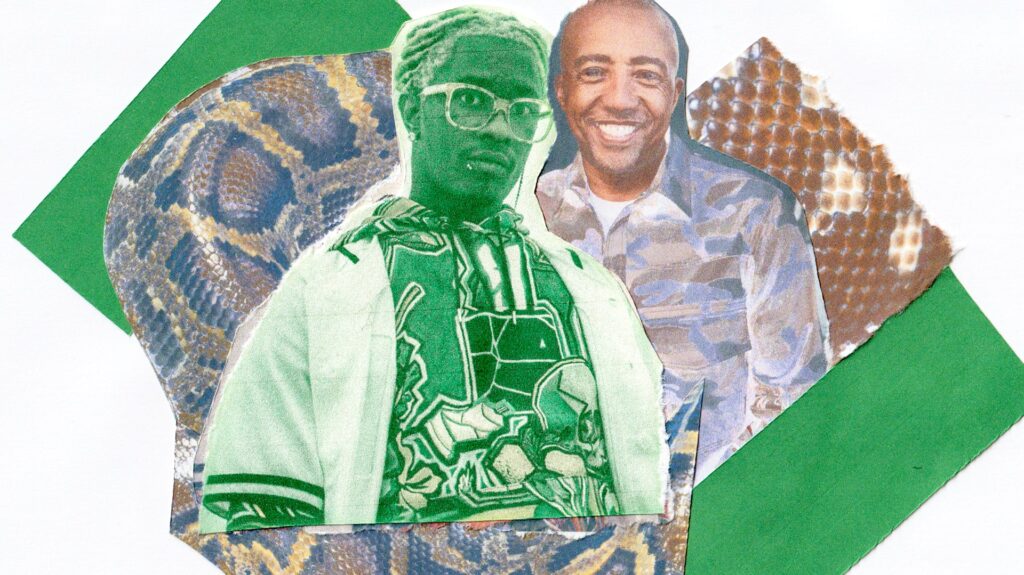
Thug had a vision beyond being a solo artist, though. And after settling into his new label home, he started floating business ideas around to 300 executives. “The first time I met Thug was at 106 & Park. He was performing with Rich Gang, and his question to me was, ‘Yeah, you work on my team, but how many people have you made a millionaire?’” says Rayna Bass, head of marketing at 300 and an early witness of YSL.
When Thug met with label executives and formally communicated his hopes of starting a new venture, Liles admits signing off on the idea was a risk for 300. “If you know the music business, everything is a gamble. Everything,” he says. “But it was just something about him. And you have to remember, this is before he had a No. 1 album. Our company is based on risk-taking, so this was not a guaranteed risk. It was a risk on energy that we felt we could build something special around.”
300 took the gamble, and the YSL experiment was officially underway. Perhaps the most accurate way to describe YSL in its early stages was “unpredictable.” Bass explains, “It definitely was a very fun but unpredictable time. And it’s a big reason why it’s so dope to see what Thug is doing with YSL, because you’ve seen the growth from [when Thug signed to 300] in 2014 to now.”
In 2016, the music industry was in a state of rapid change, and Thug didn’t have a clear blueprint for what he wanted to build. “You have to imagine, at that time, people were unsure about what the music business would be. We were not the No. 1 music in the world at the time.
All we were, were people who believed in helping other people,” Liles says. “It’s two words that Thug [and I] always say. Mine was ‘strategy’ and his was ‘timing.’ And I told him, ‘Yo, it can’t be timing without strategy.’ He said, ‘It can’t be strategy without timing.’”
The main plan of action Thug had as a new label boss was to create a platform where he could put his friends and family on. “It was not just, ‘I want to put my people on,’” clarifies YSL A&R Geoff Ogunlesi, recalling Thug’s early vision. “It was, ‘How do I put my people on so they can put people on?’ It was about changing lives.”
